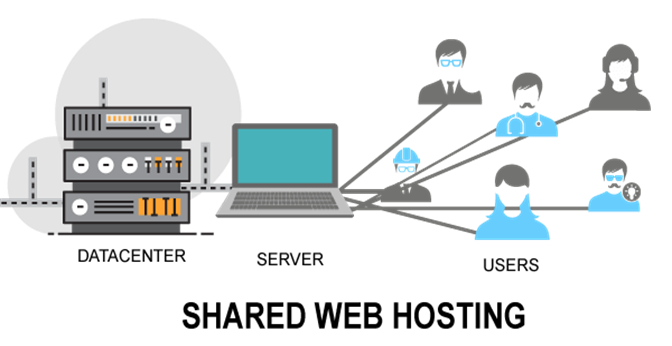Image source: hosting01.com
When hosting your website, you have to choose a hosting plan suitable for your needs. Shared hosting is where several websites are hosted in a single server. The websites share the same resources such as the bandwidth, database, storage space, FTP accounts, and email accounts.
One of the popular and cheap shared web hosting company is Bluehost.com.
A single server can host tens to thousands of websites, the server has no limitations. Hosting your website on a shared server enable to access cheaper services. Let’s take a look at the pros and cons of having a shared hosting.
Pros:
1. Cheap: Compared to other paid hosting plans, shared hosting is cheaper. The users have to share the resources in a single dedicated server making the services cheap.
2. Ease of use: Shared hosting is one of the easiest hosting option available in the market. It allows you to easily access configured software or pre-installed technologies through easy to use control panel.
3. Convenience: You don’t need any technical skills for you to access the shared server and host your website. No need for employing a professional to manage your web hosting services and database thus, making it a convenient way to host small business website.
4. No administration issues: Your web hosting company can take care of the administration and maintenance of hosting infrastructure. You don’t have to worry about admin tasks.
5. Multiple database options: Shared hosting provide users with multiple database options.
6. PHP/MYSQL support: A shared server offer support to users on the use of PHP, MySQL, and MSSQL.
7. 24/7 support: It offers 24-hour support to the users via emails, live chat or phone calls. You can easily contact the support team for technical assistance or for any other problem associated with your website.
8. Reliability: Due to around the clock supervision and the technical support you get makes shared server more reliable.
9. Easy migration: If you want to change the provider, it provides you with easy migration services.
10. Suitability: It is suitable for small businesses or beginners with few requirements.
Cons:
1. Security concerns: A shared server doesn’t allow you to install some features like antivirus programs to protect your site. If one of the hosted sites runs malicious programs, it affects all other sites in the server.
2. Limited resources: The server resources are shared among all websites hosted on the server, therefore, you have to compete for resources with all other websites registered. Increased web traffic may slow your website and makes some resources unavailable.
3. Insufficient customization: Hosting company allow you to only install default configurations of CMS programs and you can’t modify the system files to boost the performance of your site.
4. No control: The hosting company has control of the web server and you can only use the resources allocated to you.
5. The speed of access: If you have a lot of data to process, it may make the website very slow since other users are also relying on the same server.
6. Server overload: Increased web traffic from the hosted sites may overload the server making it freeze-up websites.
7. File permission risks: If you wrongly configure file access settings, other users on the server can easily access your files.
8. Cyberattack threats: The web server is prone to cyberattack by hackers or crackers leading to access to confidential information.
9. Few features: Shared hosting provides users with few features to use or benefit from.
10. Regular resource restrictions: Each website on the serve face regular resource restrictions in order to utilize the available CPU, RAM, and power.




